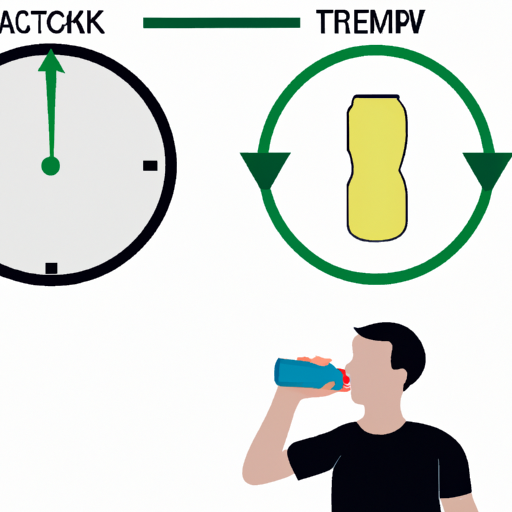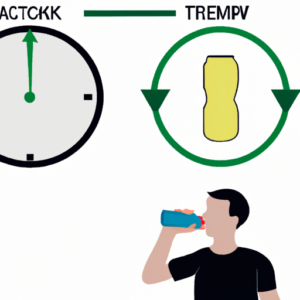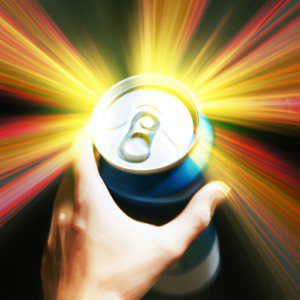Energy drinks are popular beverages with a large consumer base, especially among adolescents. While energy drinks may offer an initial burst of energy and alertness for consumers, they can also lead to crashes afterwards.
This article will explore the science behind energy drink crashes and provide advice on how to avoid them.
It has been established that some of the ingredients in energy drinks are associated with negative side effects. Caffeine, taurine, sugar, artificial sweeteners, guarana seed extract and B vitamins are all common components found in most energy drinks.
Each of these ingredients offers different effects when consumed and must be examined separately to understand their role in causing or preventing a crash after consumption.
Caffeine’s Role In Energy Drinks
Throughout the ages, mankind has been searching for ways to increase productivity and energy levels. From ancient Chinese herbal remedies to modern-day energy drinks, we have developed a variety of methods to get us through our day with increased vigor.
Caffeine is one of the most widely used ingredients in many energy drinks because it provides an immediate boost that can help people maintain alertness and focus. Caffeine acts as a stimulant to the central nervous system by blocking adenosine receptors which causes an increase in dopamine production, leading to improved concentration and mood.
Although caffeine consumption may improve mental performance, its effects are short lived and excessive amounts can lead to tolerance issues or even addiction over time. It is important for individuals who consume caffeinated beverages on a regular basis to monitor their intake and be aware of any changes in behavior or physical symptoms such as headaches or fatigue due to overconsumption. Additionally, those with existing medical conditions should consult their doctor before consuming large quantities of caffeine.
The effects of caffeine vary greatly depending upon individual physiology and lifestyle factors such as diet, stress level, exercise habits, etc., so it’s essential to understand your own body’s response when experimenting with different sources of stimulation like energy drinks. By understanding how much your body needs from these products you can avoid falling into stimulant dependency while still benefiting from the positive aspects they provide.
Taurine And Sugar Content
Energy drinks are often marketed as a way to increase energy and performance, but many of these products contain high levels of taurine and sugar.
Taurine is an organic acid found in animal tissue that has been linked to improved cardiovascular health and increased physical endurance. The amount of taurine present in energy drinks typically ranges from 500 mg to 2000 mg per 8 ounces. High doses of taurine can lead to dehydration levels, which can cause fatigue, headaches, and other symptoms associated with a crash after consuming energy drinks.
Sugar consumption from energy drinks has also been linked with the development of crashes due to its effect on energy metabolism. Consuming sugar induces a rapid rise in blood glucose followed by an equally fast drop when it is metabolized by the body. This sudden decrease in blood glucose causes extreme fatigue and drowsiness for some people who consume large amounts of sugar through energy drinks or other sources.
To avoid experiencing a crash after drinking an energy drink, it is important to be mindful of how much taurine and sugar you are consuming during each serving. It is best practice to limit your intake of both ingredients while staying aware of their effects on your individual body’s needs.
Additionally, proper hydration before and after consuming an energy drink will help maintain adequate electrolyte balance, which helps regulate water retention within the cells and prevents dehydration-related issues such as low blood pressure or dizziness.
Artificial Sweeteners And Guarana Seed Extract
The truth of the theory that energy drink crashes are caused by artificial sweeteners and guarana seed extract is supported by recent scientific research. These substances, when consumed in large amounts, can cause an individual to experience a ‘crash’ after a period of increased alertness and focus.
Artificial sweetener consumption has been linked with carbohydrate cravings due to its taste properties while guarana seed extract contains caffeine which promotes wakefulness. Excessive intake of these components may also disrupt circadian rhythms leading to altered sleep patterns.
Caffeine from guarana seeds interferes with adenosine receptors thus reducing restful sleep and increasing wakefulness during night time hours. Furthermore, studies suggest that excessive use of artificial sweeteners have been associated with metabolic alterations like obesity, diabetes and high blood pressure.
In order to minimize or avoid an energy drink crash it is important for individuals to understand their own bodies’ reaction to stimulants and be aware of the impact that certain ingredients have on them. Additionally, monitoring one’s caffeine intake throughout the day will help limit any potential side effects related to consuming too much as well as adjusting sleeping habits accordingly.
B Vitamins And Their Effects
1. B vitamins are water-soluble vitamins that are necessary for a variety of bodily functions and processes, including energy production.
2. Sources of B vitamins include animal products such as meat, poultry, eggs, and dairy, as well as plant-based foods such as nuts, legumes, grains, and leafy greens.
3. B vitamin deficiencies can result in a range of symptoms, including fatigue, memory issues, and depression.
4. As such, it is important for individuals to ensure adequate intake of B vitamins to optimize their health and help prevent energy drink crashes.
B Vitamin Sources
Adequate B vitamin intake is essential for maintaining optimal health and well-being. While most people obtain the necessary amounts of B vitamins from food sources, there are alternative means to ensure that adequate levels are being consumed.
Bone broth and herbal teas can be excellent sources of certain B vitamins, such as Riboflavin (B2), Niacin (B3) and Thiamine (B1). For instance, one cup of bone broth contains approximately 6% of a person’s daily value of Vitamin B12 while a single serving of chamomile tea provides roughly 8% of the recommended daily allowance for thiamine.
Furthermore, some types of herbal teas may also provide additional minerals and antioxidants which can help boost overall nutrition status. As such, these beverages can serve an important role in helping individuals meet their nutritional needs without relying solely on dietary sources.
Ultimately, it is wise to consider incorporating bone broth and herbal teas into one’s diet as a way to increase their intake of various B vitamins.
B Vitamin Deficiencies
B vitamin deficiencies can arise if individuals do not consume enough B vitamins through diet or supplements. Those deficient in B vitamins may experience a decrease in energy levels, impaired metabolism and other health issues.
To maintain adequate levels of B vitamins and ensure good health, it is important to ensure that one’s intake of these essential nutrients is balanced with their dietary sources as well as alternative means such as bone broth and herbal teas.
Additionally, maintaining an overall healthy lifestyle including proper exercise and careful monitoring of energy balance can help prevent the onset of B vitamin deficiencies.
As such, consuming foods rich in B vitamins along with incorporating bone broth and herbal tea into one’s daily routine are both effective strategies for ensuring optimal nutrient status.
Strategies For Avoiding Energy Drink Crashes
B vitamins are essential for numerous bodily functions and can be beneficial when consumed in moderation. However, the high levels of B vitamins found in energy drinks can cause uncomfortable side effects such as headaches, fatigue, and nausea.
To avoid these unpleasant symptoms associated with an “energy drink crash”, alternative sources of B vitamins should be considered. A registered dietitian or nutritionist may recommend a balanced diet that includes plenty of fresh fruits and vegetables to provide natural sources of B vitamins. Whole grains, legumes, nuts, and dairy products are also good dietary sources of the vitamin. Additionally, fortified breakfast cereals and nutritional supplements can help meet daily requirements if necessary.
It is important to remember that maintaining adequate hydration is just as crucial as consuming proper nutrients to prevent crashes due to energy drinks. Water helps regulate body temperature and electrolyte balance while allowing cells to function properly; it aids digestion by helping break down food into energy-producing molecules; and water flushes toxins from our bodies.
Adequate fluid intake throughout the day is key to avoiding not only energy drink-related crashes but any other exhaustion caused by dehydration.
Frequently Asked Questions
Are There Any Long-Term Side Effects Of Consuming Energy Drinks?
The Current Topic of whether there are any long-term side effects from consuming energy drinks is a pertinent inquiry.
While the short-term effects can be beneficial, such as improved mental alertness and concentration, these may come at a cost.
Caffeine dependence has been known to occur when drinking excessive amounts of energy drinks over time.
Dehydration symptoms including headaches, dizziness, and fatigue have also been linked to ingesting large quantities of caffeine without replenishing your body’s water requirements simultaneously.
Registered dietitians and nutritionists recommend limiting intake of energy drinks in order to avoid developing any adverse long-term consequences due to their consumption.
What Is The Recommended Daily Intake Of Energy Drinks?
The recommended daily intake of energy drinks is largely dependent on the individual and their caffeine tolerance. Generally, it is advised to limit consumption to no more than two cans per day, as each can may contain anywhere from 80-400 mg of caffeine depending on its size and brand.
One should also take into account any additional sources of caffeine they are consuming throughout the day such as coffee or tea in order to adjust their total intake accordingly.
Additionally, when choosing an energy drink one should consider both the sugar content and carbohydrate count in addition to the caffeine levels for a balanced approach towards achieving desired results without putting oneself at risk for developing negative side effects associated with excessive consumption.
Are Energy Drinks Safe For Children To Consume?
The safety of energy drinks for children is a contentious issue in today’s society. With the increasing popularity of these beverages, it is important to consider their potential health risks and benefits.
Energy drinks can contain high levels of caffeine that may be unsuitable for younger consumers due to possible aging risks associated with its consumption. Additionally, excessive intake of caffeine may cause adverse effects such as dehydration or insomnia, depending on the individual’s age and body size.
Therefore, it is recommended that parents consult with a registered dietitian or nutritionist before allowing their child to consume any energy drink product.
Are There Any Natural Alternatives To Energy Drinks?
As a registered dietitian and nutritionist, I am often asked if there are any natural alternatives to energy drinks.
Rather than relying on artificial stimulants such as taurine and caffeine, many people prefer herbal stimulants that can provide similar effects without the risk of rebound fatigue.
Herbal stimulants like guarana, green tea extract, ginseng root powder and kola nut can act quickly to promote alertness while providing sustained energy throughout the day.
Additionally, these herbs contain vitamins and minerals which contribute to overall health benefits.
All in all, when seeking an alternative to energy drinks, herbal stimulants may be a more sustainable option for those looking for a boost of energy with fewer risks associated.
Are There Any Benefits To Consuming Energy Drinks?
Energy drinks can provide beneficial sources of caffeine for those looking for an energy boost. Caffeine, a stimulant found in many natural and artificial substances like coffee and tea, has been linked to improved physical performance, mental alertness as well as increased concentration and focus.
The main ingredients in most energy drinks are caffeine and sugar, with some containing up to 70g of added sugars per serving. While these high levels of added sugars may be concerning from a health standpoint, the benefits associated with the consumption of moderate amounts of caffeine should not be overlooked when considering the potential advantages that consuming energy drinks can have on overall performance.
Conclusion
Energy drinks can have a number of long-term side effects and should be consumed in moderation. To avoid the potential risks associated with overconsumption, adults should limit their intake to no more than two energy drinks per day while children and adolescents should not consume them at all.
There are some natural alternatives that may provide an energy boost but without the crash such as matcha tea or green juice that contain naturally occurring caffeine and vitamins for sustained energy levels throughout the day.
Ultimately, it is up to the individual to assess whether consuming energy drinks is worth the risk based on personal health goals and lifestyle needs. With mindful consumption and consideration given to possible side effects, individuals can enjoy the benefits of occasional energy drink consumption responsibly.




